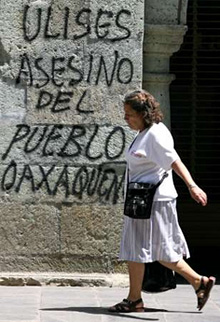Festive Sabbatical in Mexico Turns Tense
 Theresa Hogue - Corvallis Gazette-Times Theresa Hogue - Corvallis Gazette-Times


| | A woman walks past a wall containing writings that read: 'Ulises killer of Oaxacas people' at Oaxaca's main square September 28, 2006. Members of of the Popular Assembly of Oaxaca (APPO) were demanding the state governor Ulises Ruiz's resignation. (Reuters/Daniel Aguilar) |
Darryla and Dan McCrath enjoyed life in Oaxaca, Mexico, until political violence caused them to relocate to a nearby pueblo.

For many, spending a year in a foreign land is little more than a pleasant dream. But for Darryla Green and Dan McGrath, a year in Oaxaca became a reality when Dan took a sabbatical in January, and the couple moved to Oaxaca City from their Corvallis, Oregon home.

Recent political unrest, however, has made the couple question how safe it is to stay in the region. While across the rest of Mexico, the recent contested presidential election has caused much uproar, in Oaxaca, it is the state government that has caused the most recent problems.

Dan is a professor in the department of horticulture, staff chairman for the Linn County OSU Extension Service, and a regional Extension agent. Darryla is an artist, a therapist and a tai chi instructor.

The couple have continued to work while in Mexico, and for Dan, spending time in the region made sense, as the Oregon labor force in agriculture is now predominantly Hispanic.

“I am living and studying in Mexico to improve my Spanish and my understanding of the history, culture, and worldview of Hispanic farm workers in Oregon,” Dan said. “I chose Oaxaca because more than five thousand Oaxacans work on farms and in food processing plants in Oregon.”

Traveling to Oaxaca has provided Dan with an opportunity to immerse himself in the language and culture of the region, things he believes he’ll be able to bring back and share with fellow Extension faculty members and the industry he serves.

Dan is also working with the Instituto Cultural Oaxaca to design a language and cultural emersion program for OSU faculty. When he returns to Oregon next year, he plans to bring groups of faculty members and others to Oaxaca annually to participate in this program.

In addition, he’s working as a project evaluator for the U.S. Agency for International Development (USAID) mission in southern Mexico. The goal of USAID projects is to stimulate economic development in rural villages, to create jobs, and in so doing, provide young people with an alternative to migrating north for work in the United States.

For the first six months of their stay, the couple settled into the pace of life in southern Mexico, soaking in the cultural activities, enjoying the food and arts, even participating in philanthropic activities.

“There were concerts, music in the streets, people in traditional costumes having festivals, lots of dancing,” Darryla wrote from Oaxaca.

Eventually they purchased a Volkswagen to travel out of the city, exploring nearby pueblos, and expanding their knowledge of the surrounding countryside. This came in handy when things started to get tense in the city, and they decided to relocate.

In May, the state’s teachers and administrators began protesting conditions in Oaxaca’s school system by taking over the city center and camping out.

The protest was nothing unusual, but the violent response in June from the state government was. Under the orders of Gov. Ulises Ruiz Ortiz, a pre-dawn raid removed the group by force, as troops moved in with tear gas and weapons to clear the protestors out.

The brutality of the response caused a number of other groups to join forces with the teachers, and as a result, a citizen’s assembly was formed, focused on attempting to force Ortiz out of office. Marchers filled the streets, and government offices were taken over.

“With more and more violence, with blockades of the intersections, burning tires and garbage, takeover of the government offices … and evening curfews with young guys with sticks and stones and attitude,” Darryla wrote, “the city got filthier and filthier, the festive mood diminished, and desperation has taken over.”

The American Consulate has recommended that tourists not travel to Oaxaca right now, and Darryla agreed that the situation was tense.

“We felt like frogs in a pot coming slowly to a boil. We looked around and our beautiful colonial city was smeared with graffiti, blockaded by burned-out vehicles so it was impossible to go out at night, and no longer the joyful place it had been,” she said. “Many of our friends have fled, many favorite businesses have closed.”

The couple relocated to the nearby pueblo of San Pablo Etla, where they found a small home. The rural setting seemed much safer than city life, and they are still close enough to travel to Oaxaca City for Spanish lessons and errands, and to attend their dancing group. But city life is far different than it was in the spring.

“The whole tourist industry, from language schools, concerts to all the artesanias (craftspeople) all are suffering, disappearing,” Darryla said. “These are hard times.”

Their life in rural Oaxaca is a lot calmer, as Darryla described it in an e-mail to a friend back home.

“Birds call, a rooster crows, a few dogs bark as early walkers pass by on the winding dirt road. My favorite new sounds are the sad cries of the burros,” she wrote. “We will have to re-learn how to sleep through the night.”

But if the troubles in the city spill over into the countryside, that new-found peace could be shattered again.

“If the whole of Mexico descends into chaos,” Darryla wrote, “we will come home.”

Theresa Hogue can be reached by email at theresa.hogue@lee.net. |



